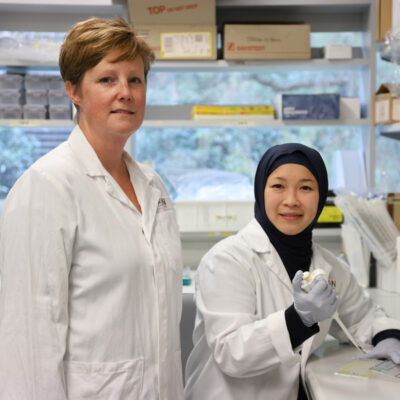RNA boost for autoimmune disease
By Rob Clancy, staff writer

The enormous potential of RNA-based treatments for autoimmune diseases has been recognised by the Victorian government, with a new grant from the mRNA Victoria Research Acceleration Fund.
The Victorian Minister for Innovation, Medical Research and the Digital Economy, the Hon Jaala Pulford MP, has granted $100,000 to Hudson Institute, which will be matched by our research partner Noxopharm Limited through its wholly owned subsidiary, Pharmorage Pty Ltd.
Autoimmune and auto-inflammatory disorders affect as many as five per cent of Australians, with uncontrolled inflammation contributing to many chronic health issues.
Focus on lupus and autoimmune disease
The focus of the research funded by this grant is lupus, an autoimmune disease with few available treatments, that causes a range of debilitating conditions, severely impacting quality-of-life and life expectancy.
Lead researcher, Associate Professor Michael Gantier, said the grant would allow this vital work to explore new horizons.
“Hudson Institute has developed a novel strategy that utilises short RNA-like molecules (known as oligonucleotides) to block TLR7 receptors. These receptors are overactivated in lupus,” A Prof Gantier said.
Great potential to treat autoimmune conditions
“Pre-clinical studies have shown that the short oligonucleotides have the ability to block TLR7 activation and subsequent inflammation, which means they show great potential to treat lupus and possibly other autoimmune conditions.”
Director and CEO of Hudson Institute, Professor Elizabeth Hartland, welcomed this investment in RNA research by the Victorian government: “Our research shows huge promise for RNA-based therapeutics by limiting the side effects of harmful inflammation that can result from immune recognition of RNA.”
“RNA therapeutics are a rapidly expanding category of drugs that have the potential to revolutionise treatments for many diseases, including those currently deemed undruggable, so every contribution to this effort is a valuable one,” Prof Hartland said.
This grant will fund further work to establish the therapeutic efficacy of these novel oligonucleotide TLR7 inhibitors in the treatment of lupus. You can read more about Hudson Institute’s work on lupus here.

RNA-based therapeutics
Associate Professor Michael Gantier
Autoimmune and auto-inflammatory disorders affect as many as 5 per cent of Australians, with uncontrolled inflammation contributing to many chronic health issues. The focus of the research funded by this grant is lupus, an autoimmune disease that causes a range of debilitating conditions, severely impacting quality-of-life and life expectancy.
Hudson Institute has developed a novel strategy that utilises short RNA-like molecules (known as oligonucleotides) to block TLR7 receptors. These receptors are overactivated in SLE. The short oligonucleotides have the ability to block TLR7 activation and subsequent inflammation in vitro. This grant will fund the laboratory work to establish the therapeutic efficacy of these novel oligonucleotide TLR7 inhibitors in several animal models as well as in primary human cells derived from SLE patients.
If this technology is proven, Noxopharm will investigate the development of further oligonucleotide drug candidates with potential indications in other autoimmune diseases.
Inflammation is an essential process in the body to recruit immune system cells to combat infection or tissue damage. It is normally a fine-tuned process that is switched off when no longer required. However, if it persists, it can cause damage to a number of organs and even death in severe cases.
Uncontrolled, inflammation can lead to chronic immune activation, leading to pathologies referred to as autoimmune or auto-inflammatory diseases. There are over 100 autoimmune diseases, among them SLE, rheumatoid arthritis and type 1 diabetes. There is no cure for autoimmune diseases to date. Current treatments that manage signs and symptoms include predominately broad-acting immunosuppressants, which tend to have deleterious side-effects. Therefore, new drugs with improved efficacy and fewer side-effects are urgently needed.
In this article
About Hudson Institute
Hudson Institute’ s research programs deliver in three areas of medical need – inflammation, cancer, women’s and newborn health. More
Hudson News
Get the inside view on discoveries and patient stories
“Thank you Hudson Institute researchers. Your work brings such hope to all women with ovarian cancer knowing that potentially women in the future won't have to go through what we have!”





